CommUnityCare Health Centers Celebrates Dr. John Weems as Recipient of the Ruth M. Bain Young Physician Award
 CommUnityCare Health Centers is proud to celebrate Dr. John Weems, Associate Director of Addiction Medicine, for receiving the prestigious Ruth M. Bain Young Physician Award by the Travis County Medical Society (TCMS). This accolade recognizes physicians 40 years or younger, or with fewer than eight years in practice, who are admired by their colleagues as model physicians. Dr. Weems’ unwavering dedication to addiction medicine, his transformative impact on patients, and his leadership in addressing one of today’s most pressing public health crises make him exceptionally deserving of this honor.
CommUnityCare Health Centers is proud to celebrate Dr. John Weems, Associate Director of Addiction Medicine, for receiving the prestigious Ruth M. Bain Young Physician Award by the Travis County Medical Society (TCMS). This accolade recognizes physicians 40 years or younger, or with fewer than eight years in practice, who are admired by their colleagues as model physicians. Dr. Weems’ unwavering dedication to addiction medicine, his transformative impact on patients, and his leadership in addressing one of today’s most pressing public health crises make him exceptionally deserving of this honor.
“I’m honored to receive the Ruth M. Bain Young Award. This recognition reflects the support of my incredible colleagues at CommUnityCare and Dell Medical School, our partners, and the resilience of the patients we serve. I am especially grateful for TCMS’ recognition of the importance of addiction medicine and its role in addressing a stigmatized disease in the face of an overdose crisis. This work is a privilege, and we are proud to serve our communities,” said Dr. Weems.
A Physician Who Leads with Compassion, Innovation and Vision
When history reflects on medicine’s response to great public health crises—from the advent of antibiotics to the fight against AIDS and the COVID-19 pandemic—it highlights visionary clinicians who lead with courage and compassion. Dr. Weems stands tall among these leaders. As an internal medicine physician and addiction medicine specialist, he is deeply committed to advancing equitable access to care for multi-marginalized communities.
As Associate Director of Addiction Medicine, Dr. Weems is instrumental in increasing access to high-quality addiction medicine services. Beyond his work at CommUnityCare Health Centers, he serves as faculty at Dell Medical School and as the lead subject matter expert for the SHOUT Texas program (Support Hospital Opioid Use Disorder Treatment).
Tackling the Opioid Epidemic
The opioid epidemic is one of the defining public health challenges of our time, touching lives both professionally and personally. In Travis County, where overdose deaths have surged in recent years, Dr. Weems has been at the forefront of efforts to combat this crisis. Through his leadership, CommUnityCare Health Centers has championed a “no-wrong-door” approach, offering a whole-person model of care that prioritizes the dignity and lived experiences of patients. Dr. Weems’ innovative strategies address not only the medical aspects of addiction but also the stigma, social determinants, and moral injury often faced by individuals living with substance use disorders.
During Austin’s fentanyl poisonings this past April, which claimed dozens of lives, Dr. Weems was part of a rapid community response that drove widespread naloxone distribution, undoubtedly saving lives. He has also led multiple town halls for the Travis County Medical Society to educate the community about life-saving medications for substance use disorders and to advocate for systemic changes.
A Leader Known for Authenticity and Advocacy
“John has championed multidisciplinary solutions to address addiction, extending far beyond medicine to tackle stigma and social drivers of health. He has cultivated a sense of joy and belonging among individuals who have often been cast out by our healthcare system. We are incredibly proud of his impact,” praised Dr. Nicholas Yagoda, Interim President and CEO of CommUnityCare Health Centers.
Dr. Weems’ authenticity sets him apart. Whether speaking with c-suite executives, city leaders, or patients, he brings the same level of respect, empathy, and humility to every interaction. His colleagues describe him as a reliable friend, a devoted husband and father, and a clinician who inspires those around him to rise to the occasion.
Dr. Mike Stefanowicz, Director of Intensive Outpatient Care at CommUnityCare, echoed the sentiment, adding, “Someday, when we look back at whether medicine truly met its moment in the face of the opioid epidemic, I am confident John will be among those to whom we attribute our collective success.”
Dr. Weems’ accomplishments remind us of the profound difference one person can make in addressing systemic issues. His work exemplifies the mission of CommUnityCare Health Centers of strengthening the health and wellbeing of the communities it serves.
Congratulations, Dr. Weems, on this well-deserved honor! To read his feature in the Travis County Medical Society Journal, visit [page14] HERE.
 Starting November 1, Executive Order GA-46 requires public hospitals to collect immigration status information from patients. However, this rule does not apply to CommUnityCare Health Centers or Carousel Pediatrics.
Starting November 1, Executive Order GA-46 requires public hospitals to collect immigration status information from patients. However, this rule does not apply to CommUnityCare Health Centers or Carousel Pediatrics.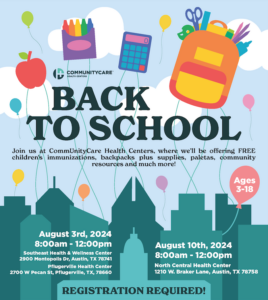 In honor of National Health Center Week, CommUnityCare Health Centers is excited to host three back-to-school events to prepare Central Texas children for the upcoming school year.
In honor of National Health Center Week, CommUnityCare Health Centers is excited to host three back-to-school events to prepare Central Texas children for the upcoming school year.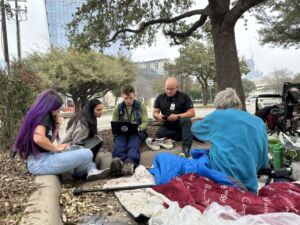 The first stop is a parking lot in downtown Austin, where the team encounters an older gentleman experiencing a new cough and shoulder pain. This is only the first of many stops throughout the day to help anyone facing barriers and unable to access healthcare at one of the 28 CommUnityCare Health Centers across Travis and Williamson County.
The first stop is a parking lot in downtown Austin, where the team encounters an older gentleman experiencing a new cough and shoulder pain. This is only the first of many stops throughout the day to help anyone facing barriers and unable to access healthcare at one of the 28 CommUnityCare Health Centers across Travis and Williamson County. 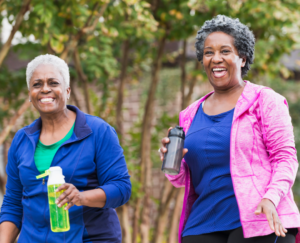 Health is about more than visiting the doctor’s office. Adding small but significant healthy habits to your daily life will lead to big improvements in your overall health and wellness in 2024. Set yourself up for long-term success with these 6 tips for getting and staying healthy in the new year.
Health is about more than visiting the doctor’s office. Adding small but significant healthy habits to your daily life will lead to big improvements in your overall health and wellness in 2024. Set yourself up for long-term success with these 6 tips for getting and staying healthy in the new year. 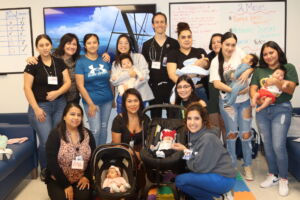 “It’s really an incredible model, you’re drawing out of the parent and empowering them to harness what they already know and key into that maternal or parental instinct,” said Dr. Michelle Gallas, Pediatrician at CommUnityCare Health Centers. “So, the idea is that families form a community inside of the medical home.”
“It’s really an incredible model, you’re drawing out of the parent and empowering them to harness what they already know and key into that maternal or parental instinct,” said Dr. Michelle Gallas, Pediatrician at CommUnityCare Health Centers. “So, the idea is that families form a community inside of the medical home.”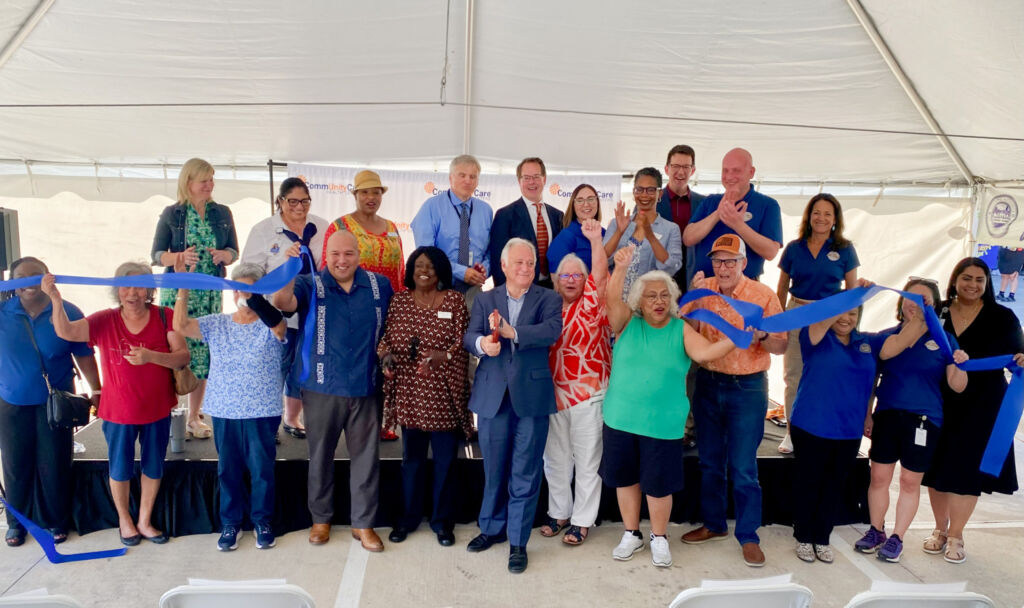
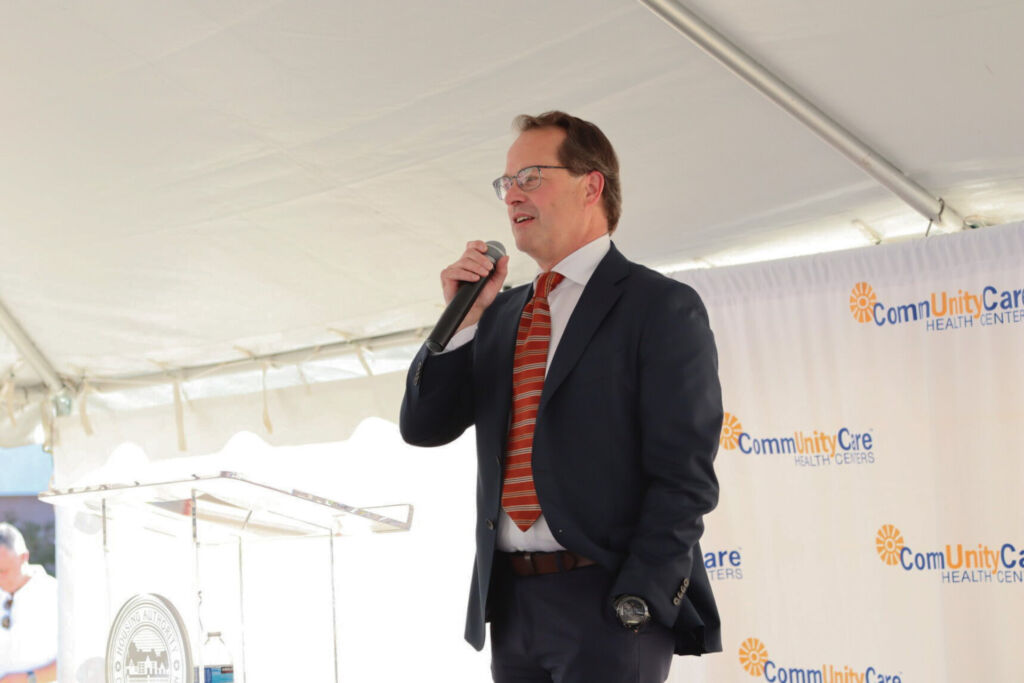
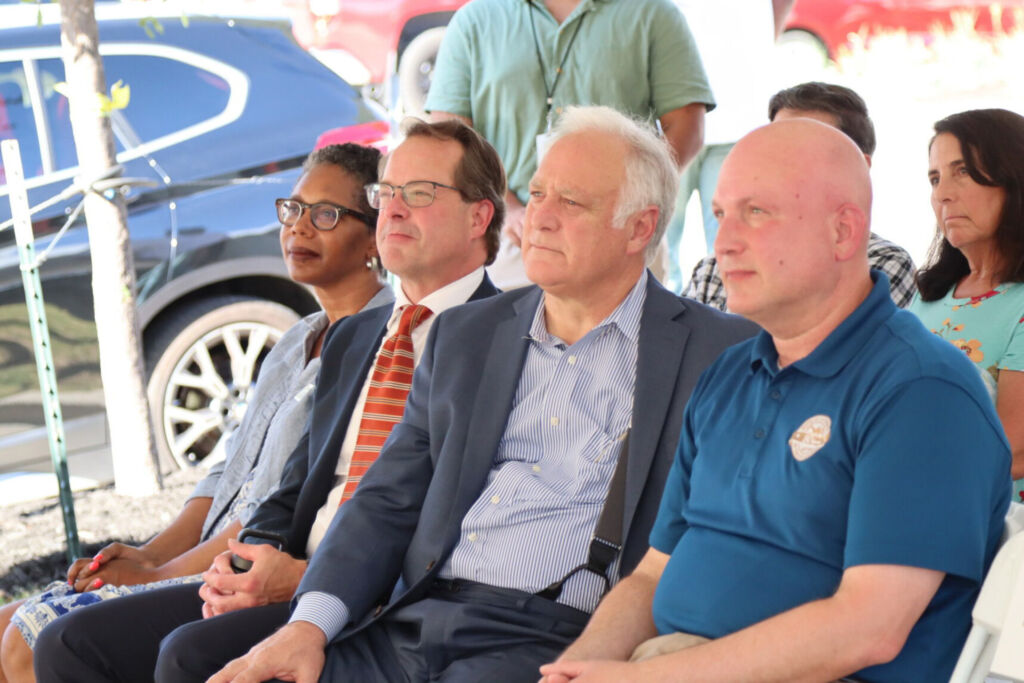


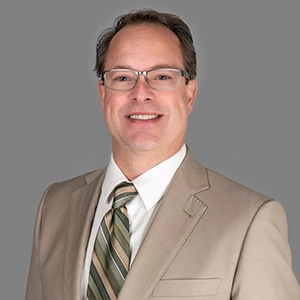 Jaeson T. Fournier, D.C., MPH, is the chief executive officer of the CommUnityCare Health Centers, which operates 28 community health centers in Central Texas, serving more than 129,000 individuals. He also serves on the board of the Texas Association of Community Health Centers.
Jaeson T. Fournier, D.C., MPH, is the chief executive officer of the CommUnityCare Health Centers, which operates 28 community health centers in Central Texas, serving more than 129,000 individuals. He also serves on the board of the Texas Association of Community Health Centers.